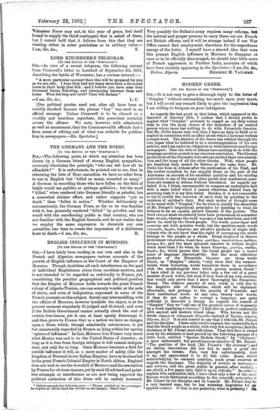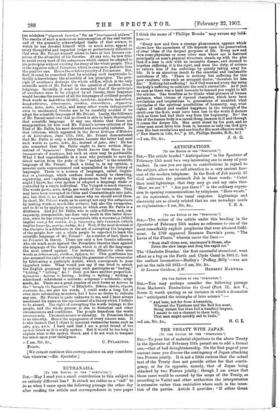MODERN GREEK.
[TO THE EDITOR OF THE "SPECTATOR."] SIE,—It is not easy to give a thorough reply to the letter of " Simplex " without encroaching too much upon your space, but I will avoid any remark likely to give the impression that I am willing to trespass on your indulgence.
As regards the last point in that letter, which appeared in the Spectator of January 25th, I confess that I should prefer to neglect what "Simplex" pretends to regard as my duty rather than to join the noisy chorus of the defenders of an exalted person whose name has nothing to do with Psicaristic theories. But Mr. Pallis knows very well that I have no duty to fulfil or to neglect in connection with an affair about which I have not written a single word. The director of the Imera has refuted through his own organ what he believed to be a misinterpretation of his own articles, and I am under no obligation to write letters to any foreign newspapers. That the riots of Athens have nothing to do with the language question as such is my sincerest conviction. The literary productions of the Psicariets have always excited their own admira- tion and the irony of all the other Greeks. Well, when people are laughing they cannot be furious at the same time. Mr. Pallis has been in Athens after the publication of his Iliad, and the cordial reception he has enjoyed there on the part of the Athenians on account of his excellent qualities and his sterling patriotism is one of the many other proofs that academical ques- tions are treated in Athens without bloodshed. As regards my belief, it is, I think, unreasonable to compare an undeniable fact with a mere belief which I cannot otherwise defend than by asserting that it is my firm belief. Besides, it is not reasonable to try to justify the omission of one's duty by pointing to the omission of another's duty. But such modes of thought seem to be usual with" Simplex," for he tries to justify the absurdity of Mr. Psicari'e linguistical principles by pointing to what he believes to be an equally absurd blunder of the purists. The word siAora must necessarily have been pronounced at a remoter time dicryfa, whereas the word repmccr.Ata has never been, and will never be, used by the Greek people. The words p.ovaerrhploy and noracrrhnt are both genuine words, but the machine-made words roma-sort, 80)1hCfrl, iSucaarhpi are abortive prodints of single indi- viduals who do not know that the right of corrupting the words belongs to the people as a whole. Every shepherd in Greece pronounces rnAecrickto, aumarbpto, auctrima, wayErio-rigio, raiStipso, ii.oropto, &c., and the most ignorant reporter in Athens laughs much more than I do when he hears aucao-ripi, atarphia, 11044 acuActri, &c., which proves that the Greek people has a sound sense of language (Sprachgefilh1). But the most ridiculous products of the Psicaristic theories are those words which, as " Simplex " admits, "only show that the vernacu- lariats when borrowing words transform them in accordance with the morphological laws which govern modern Greek." I have cited in my previous letter only a few out of a great number of such words, but even if they were of my own creation that would only prove that I know thoroughly the Psicaristic theory. The relative paucity of such words is only due to the negative side of Psicarism, which will be explained afterwards, and perhaps to the paucity of Psicarists and their intellectuAl needs. At any rate, twenty such words, if they do not suffice to corrupt a language, are quite sufficient to discredit a theory. As regards the remark of " Simplex " that we "call one of the greatest curses of humanity by a word signifying a blessing," I find this in perfect conformity with ancient and modern Greek ideas. Who knows not the Greek stapaa'ia or don/410'4S (Eirnevaes instead of 'Epivi,er, dppesn, V l etiver &c.)? It is not correct to say that I ridicule Mr. Psicari and his disciples. I have only tried to explain the undeniable fact that the Greek people as a whole, with very few exceptions, find the doctrines of Mr. Psicari most ridiculous. That this fact is owned even by his admirers is best proved by the following passage of a little book, entitled "Spoken Modern Greek," by "Chiensis." a most enthusiastic but pseudonymous admirer of Mr. Psicari. "The qualities of the book [Mr. Psicari's 'My Journey'] and its daring innovations did not fail to make a great stir amongst the Greeks. Few, very few unfortunately, took it up, and appreciated it to its full value. Some, whilst acknowledging its eminent qualities, made great reserves as regards the language. The majority of writers in newspaper: and reviews, and the great public in general, after reading, i am afraid, a few pages only, held it up to ridicule." In order to explain this undeniable fact, I have cited only a few of the moA famous words fabricated according to the scientific principles of Mr. Psicari by his disciples and by himself. Mr. Psicari may be a very learned man, but he has mistaken linguistics for an applied science. If that is not pedantry, what is pedantry ? lie has mistaken " 71teecressi &tali/An" for an " erreitovers) 7Are0o5." The results of such a monstrous misconception of the real nature and of the generally acknowledged limits of that science, to which he has devoted himself with so much noise, appear to every thoughtful and impartial judge so portentously ridiculous that even Mr. Psicari himself seems to have at last become con- scious of the absurdity of his theories. At any rate, he now tries to avoid every word of the xaeapcieuea which cannot be adapted to his principles without exciting the irony of the whole people. This is the negative side of Paicarism, which is even more pedantic than the positive one. Hence the relative paucity of Paicarisms. But, first, it must be remarked that by avoiding such ineptitudes he tacitly acknowledges the absurdity of his principles. The prin- ciple of avoidance destroys the whole edifice, which is the only scientific merit of Mr. Paicari in the question of modern Greek language. Secondly, it must be remarked that if the principle of avoidance were to be adopted by all Greeks, their language would become the poorest of all the languages of civilised peoples. Such words as aefiedamo (doubt), Siep;eoaor, tieeeeoala, aeocreeecia, Itraecieeivevor, &Bout:too-As, sLcriBeia, e6cruys1tritros, skxaporr;a, vireos,tirOos ?weds, artliCco, and many other words indispensable even to uneducated Greeks are to be carefully avoided if we adopt the scientific language of Mr. Psicari. Lastly, the followers of Mr. Psicari must own that no Greek is able to learn thoroughly that scientific language. If any one thinks that these are exaggerations, let him read Mr. Paicari's severe criticism of the Iliad of Mr. Pallis, his most devoted and successful imitator. In that criticism, which appeared in the Revue Critique d'Histoire et de Litterature, June 17th, 1901, Mr. Psicari demonstrated that Mr. Paths is only a dilettante because the latter had used such words as tarNs, aptgs, &c., instead of fats, ! He has also remarked that Mr. Pallis ought to have written Mlinis instead of 'Aya.u4ves! Every Greek knows that Wane is the iereeopurrixbe of 41mA-rpm, but such an error may be pardonable. What I find unpardonable in a man who pretends to save the Greek nation from the yoke of the " pedants " is the scientific language of Mr. Psicari. Such a thing is, in my opinion, a monster quite unprecedented and unparalleled in the history of languages. There is a science of languages, called linguis- tics or f„lossology, which confines itself merely to observing, registering, and explaining the phenomena, but no people, for aught I know, has ever spoken or adopted a language made or controlled by a single individual. The Volapiik is much sincerer. The words faveos, aveis avliqcs are words of the vernacular. They may have been corrupted in Chios and Constantinople into Each, aeis. but that is no sufficient reason why we should avoid them. In short, Mr. Psicari wants us to corrupt not only the tecteapetIouou by making words so much like colltater, but also the vernacular, and to do so by applying a science, in which even Mr. Pallis is a dilettante. And yet Mr. Paths, who is only a follower, and, con- sequently, irresponsible, has done very much in this latter direc- tion, since he has corrupted repoce foActia into a irepssepaAtjc (which implies reoaca for rsoAa;a, &c.), •rnXecrxifiriu into TIARITICht (which implies Sixaeripi, keerrhpl,axa34ipt, &o.) Well, if the most devoted of the disciples is a dilettante in the art of corrupting the language of tho people, how can a whole people be expected to learn the scientific language of Mr. Psicari? As a matter of fact, there is no Paicarist in theory. There are only a few fanatic adherers, who sin much more against the Psicariatic theories than against the language of the Greek people, which is of all the languages the most sinned against. For instance, Eftaliotis often uses words as ?Peowriao.p.bs, sbcriCEIO, gX0p7ra, &c. This gentleman has also assumed the right of enriching the grammar of the vernacular by fabricating a participle Aoristi, which corresponds to your imperfect tense. What would you say if one tried to enrich the English grammar by making such participles as " hading," "tolding," " lefting," &c. ? Here you have another proportion : epforrovras : Cpovras = having : hading = writing : wroting = schreibend : schriebend = scribens : seripsens = scribendo : scrip- sendo, &c. There are a great number of such forms as d'Orras in the " 'Irropta •ris Poyhtocrliros" of Eftaliotis. tl1oAo,accabs, cr6xocrn, avviAsslin, &c., are also his words. I could make a long list of even more astounding monsters but I have no desire to ridicule any one. Mr. Psicari is quite unknown to me, and I have always mentioned his name as the representant of a theory which I believe to be absurd. The right of corrupting the words belongs to the people, and the whole process is due to historical and other circumstances and conditions. The people transform the words unconsciously. Unconsciousness is sincerity. In Psicarism there is no sincerity. Hence the repugnance of every sincere man. It i4 also inexact that I object to innocent vernacular terms such as dai, x"te..r.A. I have said that I am a great friend of the spoken Greek as it is really spoken. But it would be too long to explain what is the spoken Greek, and I do not wish to trespass too much upon your indulgence.
—I am, Sir, Sic., C. PYLARINOS.
Trieste.
[We cannot continue this correspondence on any considera- tion whatever.—En. Spectator.]











































 Previous page
Previous page